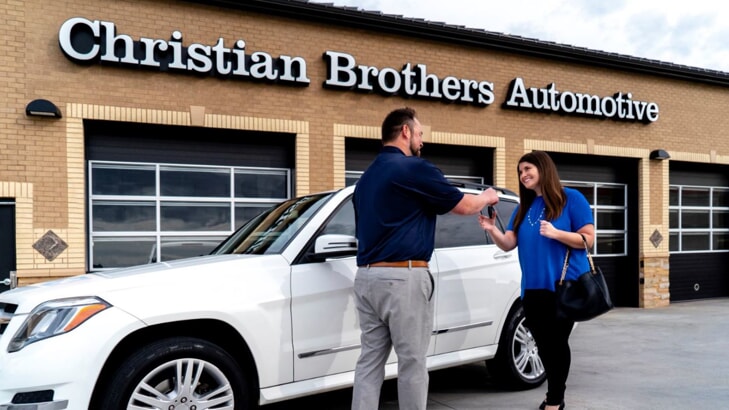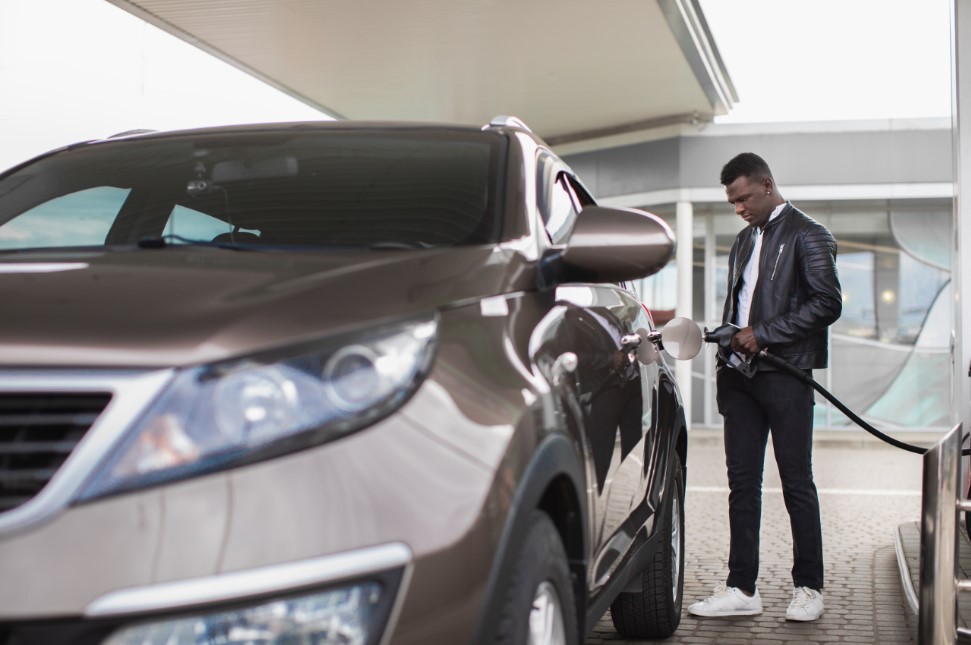4 Signs You Need a Brake Check

Did you know that, for nearly every vehicle in production today, when traveling over 60 miles per hour, it takes almost 100 yards to come to a sudden and complete stop? That's the length of a football field! This might be the only time you don’t want to make a touchdown. With that being our reality, we feel it's crucial to stay on top of your regularly scheduled brake maintenance.
The expert technicians at Christian Brothers Automotive are here with seven signs that it's time for a brake check.
7 Signs You Need a Brake Check
NUMBER ONE: If you have worn pads or components, you need a brake check.
Brake pads play a pivotal role in the braking system of a vehicle. When you press the brake pedal, it triggers a hydraulic fluid in the caliper to push each brake pad against both sides of the rotating brake rotor. This results in friction which slows and eventually stops your vehicle.
However, over time and with consistent use, these brake pads wear thin. If they're worn out, they won’t stop your car effectively and quickly, increasing the risk of accidents. The rotor may also wear out, which is what prevents the brakes from overheating.
Brake pads should be replaced every 25,000 to 65,000 miles, while rotors typically require replacement anywhere from 30,000 to 70,000 miles. Bringing your car into a local auto shop as soon as possible will help ensure your brakes are ready for the next time you need to make a quick stop.
NUMBER TWO: If you hear squealing, squeaking, grinding, or some other odd sound when braking, you need a brake check.
Vehicles are equipped with a compact sensor within the braking system designed to detect when the brake pads have become worn. This indicator releases a high-pitched sound to signify that the brake pads need replacing.
In addition to the sensor’s squealing, you might hear a grinding sound when you come to a stop. If this occurs, there's a good chance that things have gone beyond the sensor and metal is grinding against metal. This grinding sound can be heard while moving forward or in reverse. While this is not exclusively true, grinding sounds while braking when moving in reverse is often indicative of the need for rear brake service. Metal grinding or scraping on metal can cause permanent damage to your rotors, so it’s essential to bring your car to a reliable shop for service soon.
NUMBER THREE: If your vehicle pulls to one side when you brake, you need a brake check.
Is your car constantly pulling off to one side while braking? Your pads could be worn unevenly, thus applying different amounts of pressure to each side and causing your vehicle to veer over. An expert technician can diagnose the issue and determine if new brake pads are needed.
Uneven wear can be caused by misalignment in your tires, dirty or warped rotors, inconsistent brake pad makes, brake caliper sticking, or something else entirely. This is one sign that it’s best to leave the guesswork in your rearview mirror and have a professional take a look instead!
NUMBER FOUR: If you have vibrations or shaking in your steering column when you brake, you need a brake check.
When your car has an anti-lock brake system (ABS), it’s normal to feel pulsing or small vibrations on sudden stops or hard braking emergencies. However, there is likely an issue if those vibrations occur under normal braking conditions.
Vibrating brakes could indicate distorted rotors. If your brakes aren’t stopping unless you push them all the way to the floor or the brakes engage at the slightest touch, these are also signs that something is wrong. Swing by for brake service immediately!
NUMBER FIVE: If you have low or dirty brake fluid, you need a brake check.
Issues with your brakes might stem from low or contaminated brake fluid. This fluid, which is essential for proper braking and protection for the various parts of your braking system, will lead to poor brake performance if it is dirty or not at optimal levels. Brake fluid should be a golden yellow color. If it’s closer to black, your braking system is weakened and needs a brake check or even a brake fluid flush.
NUMBER SIX: If your brake warning light comes on, you need a brake check.
An illuminated ABS warning light on your dashboard could mean a serious problem with your brakes. It could result from low brake fluid, worn brake pads, or more serious mechanical issues, all of which require immediate attention. Don’t put off a visit to your trusted mechanic.
NUMBER SEVEN: If your brake pedal feels spongy when pressed, you need a brake check.
Brakes that are spongy or softer than usual could indicate that there is air somewhere in your brake lines, a problem with the master cylinder, or an issue with the brake fluid. This can seriously affect your ability to brake effectively and warrants immediate attention.
Stay Safe With Regular Brake checks From Christian Brothers Automotive
As soon as you notice any of these signs or symptoms, don’t hesitate to schedule a brake check with a professional you trust. A little proactive maintenance can go a long way in preventing costly repairs down the road or even a disaster on the road!
While regular brake checks should be scheduled around every 10,000 to 15,000 miles (depending on your vehicle's make and model), you should also watch the above warning signs. This combination will keep your pads and rotors in the best condition and your vehicle ready to stop when you (and others) need it to!
If it’s been some time since your last brake check-up or you're confident that it's time for your brake pads to be replaced, our professionally-trained expert technicians are here to help. With hundreds of locations across the U.S., Christian Brothers Automotive proudly provides quality brake repair and replacement services that Drive Joy in our local communities.
Looking for a brake check, pad replacements, or other brake services for a safer ride? Find your closest Christian Brothers Automotive shop and reach out by phone or schedule an appointment today with our online scheduling feature.
Editor's note: This post was originally published in 2014 and updated in 2024 to include changes in industry standards and trends.


[1].jpg)
Sunwash-Tech-with-Customer.jpg)

